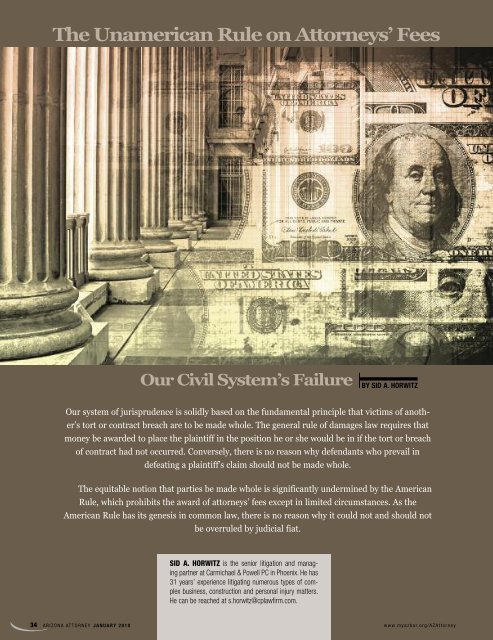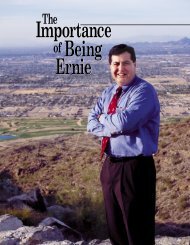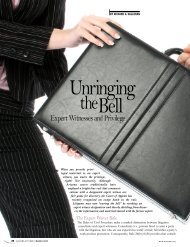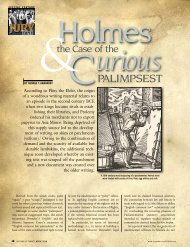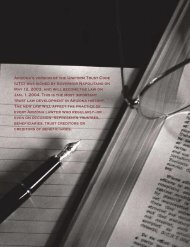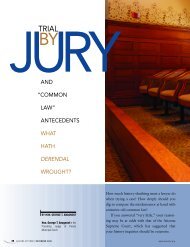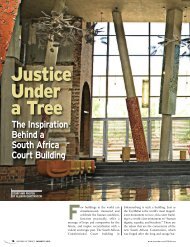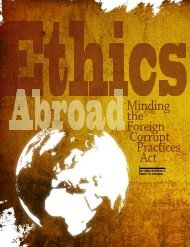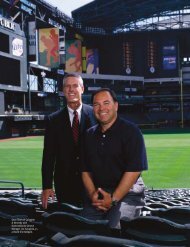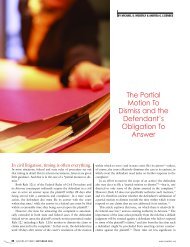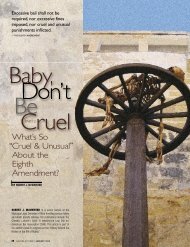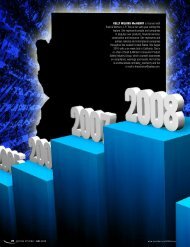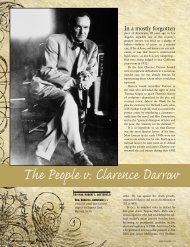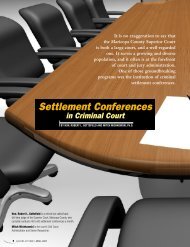The Unamerican Rule on Attorneys' Fees - Lawyers
The Unamerican Rule on Attorneys' Fees - Lawyers
The Unamerican Rule on Attorneys' Fees - Lawyers
- No tags were found...
Create successful ePaper yourself
Turn your PDF publications into a flip-book with our unique Google optimized e-Paper software.
<str<strong>on</strong>g>The</str<strong>on</strong>g> <str<strong>on</strong>g>Unamerican</str<strong>on</strong>g> <str<strong>on</strong>g>Rule</str<strong>on</strong>g> <strong>on</strong> Attorneys’ <strong>Fees</strong>Our Civil System’s FailureBY SID A. HORWITZOur system of jurisprudence is solidly based <strong>on</strong> the fundamental principle that victims of another’stort or c<strong>on</strong>tract breach are to be made whole. <str<strong>on</strong>g>The</str<strong>on</strong>g> general rule of damages law requires thatm<strong>on</strong>ey be awarded to place the plaintiff in the positi<strong>on</strong> he or she would be in if the tort or breachof c<strong>on</strong>tract had not occurred. C<strong>on</strong>versely, there is no reas<strong>on</strong> why defendants who prevail indefeating a plaintiff’s claim should not be made whole.<str<strong>on</strong>g>The</str<strong>on</strong>g> equitable noti<strong>on</strong> that parties be made whole is significantly undermined by the American<str<strong>on</strong>g>Rule</str<strong>on</strong>g>, which prohibits the award of attorneys’ fees except in limited circumstances. As theAmerican <str<strong>on</strong>g>Rule</str<strong>on</strong>g> has its genesis in comm<strong>on</strong> law, there is no reas<strong>on</strong> why it could not and should notbe overruled by judicial fiat.SID A. HORWITZ is the senior litigati<strong>on</strong> and managingpartner at Carmichael & Powell PC in Phoenix. He has31 years’ experience litigating numerous types of complexbusiness, c<strong>on</strong>structi<strong>on</strong> and pers<strong>on</strong>al injury matters.He can be reached at s.horwitz@cplawfirm.com.34 A R I Z O N A AT T O R N E Y J A N U A R Y 2 0 1 0w w w. m y a z b a r. o r g / A Z A t t o r n e y
<str<strong>on</strong>g>The</str<strong>on</strong>g> Harm CausedOur judicial system fails victims of ec<strong>on</strong>omictorts and defendants alike by notawarding attorneys’ fees to the prevailingparty. Unlike breach of c<strong>on</strong>tract cases, forwhich A.R.S. § 12-341.01 allows the prevailingparty to recoup his or her reas<strong>on</strong>ableattorneys’ fees, parties in ec<strong>on</strong>omictort cases have no such right. Unlikepers<strong>on</strong>al injury cases, there is no builtinmechanism for claimants to recovertheir attorneys’ fees through “painand suffering” damages, which are inreality artificial mechanisms to assurepayment of attorneys’ fees. In fact, thepers<strong>on</strong>al injury plaintiff achieves anunfair advantage over the pers<strong>on</strong>alinjury defendant, who has no opportunityto be made whole under anycircumstance. In ec<strong>on</strong>omic tort cases,neither party has the ability to bemade whole.A major impediment to the fundamentalright to be made whole is theAmerican <str<strong>on</strong>g>Rule</str<strong>on</strong>g>, which denies the prevailingparty the right to recover attorneys’fees in many cases. <str<strong>on</strong>g>The</str<strong>on</strong>g> n<strong>on</strong>recoverabilityof attorneys’ fees fostersnuisance litigati<strong>on</strong> and “ec<strong>on</strong>omicallymotivated” settlements, which havenothing to do with the merits. <str<strong>on</strong>g>The</str<strong>on</strong>g>n<strong>on</strong>recoverability of attorneys’ feesalso encourages the stubborn defenseof valid cases in order to make theclaimant’s claim unprosecutable in practice.A plaintiff who must spend $25,000,$50,000 or $100,000 to “prevail” against adefendant at fault for an ec<strong>on</strong>omic tort isstill a loser—and so is the defendant whomust spend $25,000, $50,000 or$100,000 to defeat an invalid claim.Social Goals AdvancedWhat harm is there is granting the prevailingparty in all cases the right to recoverreas<strong>on</strong>able attorneys’ fees and otherexpenses? What social policy could possiblybe advanced for denying prevailing partiesthe right to be made whole? Could it be todiscourage litigati<strong>on</strong> or punish litigants forresorting to civil remedial law?This hardly seems like a lofty goal.Without the right to redress (and to defendthe right to redress), civilized society fallsinto anarchy, in which the law of the junglec<strong>on</strong>trols. Civil litigati<strong>on</strong> should have thepositive attributes of both discouraging badbehavior and reducing the need for governmentalregulati<strong>on</strong> and c<strong>on</strong>trol throughtaxpayer-funded bureaucracies.Without the rightto redress (andto defend theright to redress),civilized societyfalls into anarchy,in which thelaw of thejungle c<strong>on</strong>trols.Of course, if the social policy to beadvanced is to discourage litigati<strong>on</strong>, <strong>on</strong>emust ask why that is so, and whether weare accomplishing our goal. It sure doesn’tseem that we are; courts are as overloadedas ever with civil cases of all types.If we are going to have a civil case system,the role of judges should be to administerjustice. Unfortunately, the American <str<strong>on</strong>g>Rule</str<strong>on</strong>g>of attorneys’ fees hampers judges fromdoing just that.Barmat and Sparks<str<strong>on</strong>g>The</str<strong>on</strong>g> Ariz<strong>on</strong>a case of Barmat v. John andJane Doe Partners A-D 1 has illogicallyturned A.R.S. § 12-341.01 <strong>on</strong> its head sothat professi<strong>on</strong>al negligence cases (whichdirectly arise from and could not exist butfor a c<strong>on</strong>tractual relati<strong>on</strong>ship) are not ec<strong>on</strong>omicallyviable to sue <strong>on</strong> or to defend.Cases against attorneys, accountants,architects, engineers, c<strong>on</strong>tractors, appraisers,insurance agents and a host of otherprofessi<strong>on</strong>als are discouraged due to ec<strong>on</strong>omics.<str<strong>on</strong>g>The</str<strong>on</strong>g> same is true of intenti<strong>on</strong>altort cases, such as interference with c<strong>on</strong>tract,trespass and c<strong>on</strong>versi<strong>on</strong> cases.<str<strong>on</strong>g>The</str<strong>on</strong>g> ethical attorney must advise suchclaimants that their $25,000, $50,000or possibly even $100,000 case is notworth pursuing—even where liability isfairly clear. By the same token, regardlessof the merits of their defense,defendants are motivated to settle casesfor purely ec<strong>on</strong>omic reas<strong>on</strong>s. This is anabominati<strong>on</strong> of justice in a society thatshould have the laudatory goal of seeingdisputes adjudicated up<strong>on</strong> theirmerits.<str<strong>on</strong>g>The</str<strong>on</strong>g> Barmat decisi<strong>on</strong> usurped legislativeauthority, violated legislativeintent, illogically interpreted the lawand unjustifiably restricted claimants’access to the courts by diluting theiractual net recovery. <str<strong>on</strong>g>The</str<strong>on</strong>g> real effect ofthe Barmat decisi<strong>on</strong> is to chill socalledsmall claimants from pursuingjust claims against professi<strong>on</strong>als whodo not properly perform their c<strong>on</strong>tractualobligati<strong>on</strong>s.In Sparks v. Republic Nati<strong>on</strong>al LifeInsurance Co., 2 the Ariz<strong>on</strong>a SupremeCourt employed logic that allowed for therecovery of attorneys’ fees in bad-faithcases against insurance companies.Although Barmat attempted to rec<strong>on</strong>cileits holding with Sparks, there is no real distincti<strong>on</strong>between these two cases. <str<strong>on</strong>g>The</str<strong>on</strong>g>re isno express language in the insurance policywhich states that an insurer shall act in“good faith.” This is a duty that evolvedthrough comm<strong>on</strong> law decisi<strong>on</strong>s interpretingthe relati<strong>on</strong>ship between insurers andinsureds. In other words, it is implied-inlaw,not in-fact. Regardless of the semanticsemployed, if <strong>on</strong>e employs the true“but for” test that Barmat purports tohold as being determinative, the said test ismet in a professi<strong>on</strong>al negligence c<strong>on</strong>text.<str<strong>on</strong>g>The</str<strong>on</strong>g> genesis of the relati<strong>on</strong>ship betweenattorneys and other professi<strong>on</strong>als and theirw w w. m y a z b a r. o r g / A Z A t t o r n e y J A N U A R Y 2 0 1 0 A R I Z O N A AT T O R N E Y 35
<str<strong>on</strong>g>The</str<strong>on</strong>g> <str<strong>on</strong>g>Unamerican</str<strong>on</strong>g> <str<strong>on</strong>g>Rule</str<strong>on</strong>g> <strong>on</strong> Attorneys’ <strong>Fees</strong>clients is c<strong>on</strong>tractual in nature. “But for”the existence of that c<strong>on</strong>tract, there wouldbe no relati<strong>on</strong>ship, and there could be noclaim. Under the Sparks test, “as l<strong>on</strong>g asthe cause of acti<strong>on</strong> and tort could not existbut for the breach of c<strong>on</strong>tract,” attorneys’fees are awardable. In fact, A.R.S. § 12-341.01 does not require there to be abreach of any c<strong>on</strong>tractual duty; it merelystates that in any c<strong>on</strong>tested acti<strong>on</strong> arisingout of an express or implied c<strong>on</strong>tract, attorneys’fees are awardable.How Barmat Falls<str<strong>on</strong>g>The</str<strong>on</strong>g> Barmat analysis begins by acknowledgingthat a c<strong>on</strong>tract between a lawyerand client implies competent and ethicalrepresentati<strong>on</strong>. In truth, all c<strong>on</strong>tractsincorporate the law by implicati<strong>on</strong>. Underthe ethical rules, which are an implied partof the attorney–client c<strong>on</strong>tract, “A lawyershall provide competent representati<strong>on</strong>.”(See ER 1.1.) Despite its acknowledgmentthat the professi<strong>on</strong>al’s c<strong>on</strong>tract with hisclient necessarily incorporates the law,Barmat proceeds to circularly evade thelogical c<strong>on</strong>clusi<strong>on</strong> of such implicati<strong>on</strong>.First, the Ariz<strong>on</strong>a Supreme Courtanalogized a professi<strong>on</strong>al’s c<strong>on</strong>tractualrelati<strong>on</strong>ship with an ordinary negligenceacti<strong>on</strong> by a bus passenger against his carrieror by a tenant against his landlord. Butan ordinary negligence acti<strong>on</strong> for pers<strong>on</strong>alinjuries is not equivalent to an acti<strong>on</strong>brought primarily for ec<strong>on</strong>omic damagesby a client who enters into a c<strong>on</strong>tract withan attorney. Unlike pers<strong>on</strong>al injury cases,which allow for the award of pain and sufferingdamages, there is no such built-inmechanism in ec<strong>on</strong>omic tort cases. 3Sec<strong>on</strong>d, the Ariz<strong>on</strong>a Supreme Courtprovided no specific authority for its beliefthat the text of A.R.S. § 12-341 does notrequire “so broad of an interpretati<strong>on</strong>.”<str<strong>on</strong>g>The</str<strong>on</strong>g> legislative intent of A.R.S. § 12-341.01 could not be more clear: It is to“mitigate the burden of the expense of litigati<strong>on</strong>to establish a just claim or a justdefense.” A.R.S. § 12-341.01 does not distinguishbetween implied-in-law andimplied-in-fact duties. This is judicial rhetoric,which was employed in Barmat toevade the broad intent of the Legislatureto allow prevailing parties in claims arisingout of c<strong>on</strong>tracts, express or implied, torecover attorneys’ fees to mitigate the burdenof litigati<strong>on</strong>.Third, as for the Ariz<strong>on</strong>a SupremeCourt’s citati<strong>on</strong> to the Wagenseller case asevidence of legislative intent, that case infact indicates an intent c<strong>on</strong>trary to theholding in Barmat. Wagenseller quotedSenator Walsh, who stated that the purposeof A.R.S. § 12-341.01 “would bringAriz<strong>on</strong>a more in line with a porti<strong>on</strong> of theBritish system where they have less litigati<strong>on</strong>than the United States.” 4 Under the“English <str<strong>on</strong>g>Rule</str<strong>on</strong>g>,” attorneys’ fees are awardedto all litigants as costs. 5 If the Ariz<strong>on</strong>aSupreme Court truly believes the Ariz<strong>on</strong>aLegislature intended to bring Ariz<strong>on</strong>amore in line with the English <str<strong>on</strong>g>Rule</str<strong>on</strong>g>, itshould broadly interpret A.R.S. § 12-341.01 so as to be c<strong>on</strong>sistent therewith.Fourth, the Ariz<strong>on</strong>a Supreme Court’sreliance <strong>on</strong> Salt River Project AgricultureImprovement and Power District v.Westinghouse Electric Corp. 6 is misplaced.Salt River Project held that where a party’sdamages were primarily “ec<strong>on</strong>omic” innature as opposed to representative of pers<strong>on</strong>alinjury or property damage, theCourt would look to the c<strong>on</strong>tract in determiningthe remedies of the parties. If anything,Salt River Project supports thenoti<strong>on</strong> that an ec<strong>on</strong>omically damagedplaintiff has claims that are essentially c<strong>on</strong>tractualin nature. Under this logic, attorneys’fees should be recoverable underA.R.S. § 12-341.01.C<strong>on</strong>clusi<strong>on</strong>Justice Oliver Wendell Holmes, Jr., <strong>on</strong>cewrote that “<str<strong>on</strong>g>The</str<strong>on</strong>g> life of the law has notbeen logic: It has been experience.”Regardless of whether law should be governedby logic or experience, it is supposedto be about fairness. <str<strong>on</strong>g>The</str<strong>on</strong>g> effect of theBarmat decisi<strong>on</strong> is to discourage plaintiffswith just, albeit so-called small, claimsfrom obtaining a fair and full recovery andto discourage defendants from c<strong>on</strong>testingnuisance lawsuits.<str<strong>on</strong>g>The</str<strong>on</strong>g> effect of our <str<strong>on</strong>g>Rule</str<strong>on</strong>g>s of CivilProcedure, including pleadings, moti<strong>on</strong>s,discovery, disclosure, depositi<strong>on</strong>s, pre-trialprocedures and trial, has been to causeeven the smallest of claims to c<strong>on</strong>servativelyresult in attorneys’ fees of nothing lessthan $25,000 (based <strong>on</strong> “reas<strong>on</strong>able”hourly rates). Does this mean that a pers<strong>on</strong>who has a claim for “<strong>on</strong>ly” $10,000,$20,000 or $30,000 or even more may aswell just “forget about it” because the ec<strong>on</strong>omicsdo not justify resort to the courtsystem?It is high time for the American <str<strong>on</strong>g>Rule</str<strong>on</strong>g> todisappear into the sunset. Let us adopt arule whereby all prevailing parties, plaintiffsand defendants alike, may achieve a full andAZfair recovery and be made whole. ATendnotes1. 747 P.2d 1218 (Ariz. 1987).2. 647 P.2d 1127 (Ariz. 1982).3. In furtherance of the goal of limiting recovery so as to discouragelitigati<strong>on</strong>, in Reed v. Mitchell and Timbanard, P.C., 903 P.2d 621(Ariz. Ct. App. 1995), the Ariz<strong>on</strong>a Court of Appeals held thatemoti<strong>on</strong>al distress damages are not recoverable in cases againstprofessi<strong>on</strong>als involving purely ec<strong>on</strong>omic injury. According to theAriz<strong>on</strong>a Court of Appeals, distress <strong>on</strong>ly results from physicalinjury. As a matter of comm<strong>on</strong> sense, every<strong>on</strong>e knows that ec<strong>on</strong>omicdamage causes stress. A court probably could take judicialnotice that ec<strong>on</strong>omic difficulties cause stress and distress. <str<strong>on</strong>g>The</str<strong>on</strong>g> Reedcase simply employs another ficti<strong>on</strong> to limit recoverability in casesinvolving professi<strong>on</strong>als.4. See Wagenseller v. Scottsdale Mem’l Hosp., 710 P.2d 1025, 1046(Ariz. 1985).5. See Rambow, Note, Statutory Attorneys <strong>Fees</strong> in Ariz<strong>on</strong>a: An Analysisof A.R.S. Secti<strong>on</strong> 12-341.01, 24 ARIZ. L. REV. 659, 661 (1982).6. 694 P.2d 198 (Ariz. 1984).36A R I Z O N A AT T O R N E Y J A N U A R Y 2 0 1 0w w w. m y a z b a r. o r g / A Z A t t o r n e y


